OXALIPLATIN - INJECTION
PHONETIC PRONUNCIATION: (ox-AL-ih-plah-tin)
COMMON BRAND NAME(S): Eloxatin
GENERIC NAME(S): oxaliplatin
Uses
USES: This medication is used to treat advanced cancer of the colon and rectum. Oxaliplatin is a chemotherapy drug that contains platinum. It is used in combination with other medications to slow or stop cancer cell growth.
How to use OXALIPLATIN - INJECTION
HOW TO USE: Read the Patient Information Leaflet if available from your health care professional before you receive oxaliplatin. This medication is usually given by infusion into a vein over at least 2 hours by a health care professional. It is usually given every 2 weeks along with other medications (e.g., 5-fluorouracil and leucovorin). The dosage is based on your medical condition, body size, and response to therapy.
Side Effects
Precautions
Interactions
Overdose
Images
Reviews
Faq for OXALIPLATIN - INJECTION
Oxaliplatin injection is used to treat advanced colon or rectal cancer.
Oxaliplatin is a chemotherapy drug that works by interfering with the growth of cancer cells and ultimately killing them.
Oxaliplatin is administered through an intravenous (IV) infusion by a healthcare professional. It is usually given once every two weeks.
Common side effects of Oxaliplatin include nausea, vomiting, diarrhea, numbness or tingling in the hands and feet (neuropathy), fatigue, and temporary hair loss.
The duration of treatment with Oxaliplatin can vary depending on the stage and type of cancer. It is typically given in cycles, with a certain number of cycles completed over several months.
Yes, some serious side effects of Oxaliplatin can include severe allergic reactions, blood disorders, lung problems, liver damage, and kidney problems. It is important to contact your doctor immediately if you experience any unusual symptoms.
Oxaliplatin should not be used during pregnancy as it may harm the unborn baby. It is important to use effective birth control methods during treatment and for several months after the last dose.
It is generally recommended to avoid alcohol consumption during Oxaliplatin treatment, as it can increase the risk of certain side effects and interfere with the effectiveness of the drug.
It is important to follow your doctor's instructions regarding diet, hydration, and other medications during Oxaliplatin treatment. You may also need regular blood tests to monitor your body's response to the drug.
Warning
WARNING: Oxaliplatin may rarely cause a severe (possibly fatal) allergic reaction within minutes after a dose. Get medical help right away if you develop any signs of an allergic reaction (such as rash, itching, swelling, trouble breathing, swelling of throat, dizziness).
Disclaimer
IMPORTANT: HOW TO USE THIS INFORMATION: This is a summary and does NOT have all possible information about this product. This information does not assure that this product is safe, effective, or appropriate for you. This information is not individual medical advice and does not substitute for the advice of your health care professional. Always ask your health care professional for complete information about this product and your specific health needs.
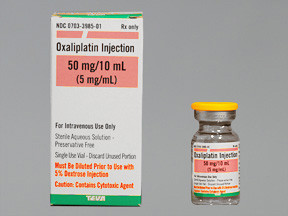
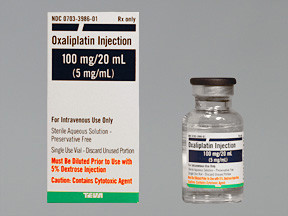
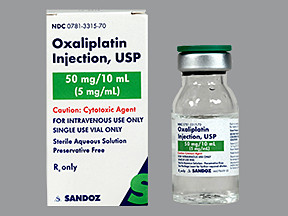
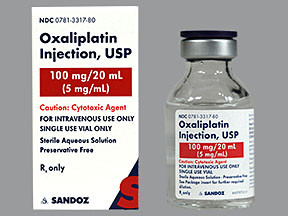
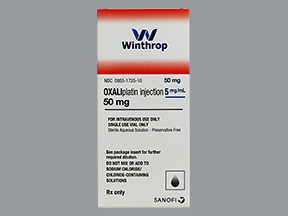
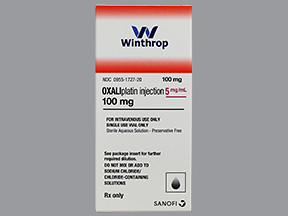

No Reviews Yet